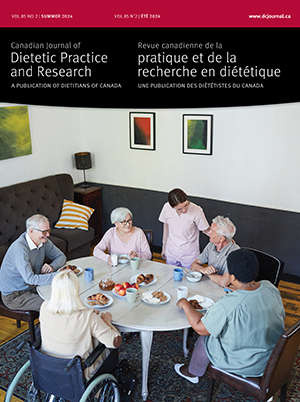Abstract
Purpose: To examine whether Indigenous identity and food insecurity combined were associated with self-reported poor health.
Methods: Data from the 2015–2016 Canadian Community Health Survey and multiple logistic regression were employed to evaluate the association between Indigenous identity, household food insecurity, and health outcomes, adjusted for individual and household covariates. The Alexander Research Committee in Alexander First Nation (Treaty 6) reviewed the manuscript and commented on the interpretation of study findings.
Results: Data were from 59082 adults (3756 Indigenous). The prevalence of household food insecurity was 26.3% for Indigenous adults and 9.8% for non-Indigenous adults (weighted to the Canadian population). Food-secure Indigenous adults, food-insecure non-Indigenous adults, and food-insecure Indigenous adults had significantly (p < 0.001) greater odds of poor health outcomes than food-secure non-Indigenous adults (referent group). Food-insecure Indigenous adults had 1.96 [95% CI:1.53,2.52], 3.73 [95% CI: 2.95,4.72], 3.00 [95% CI:2.37,3.79], and 3.94 [95% CI:3.02,5.14] greater odds of a chronic health condition, a chronic mental health disorder, poor general health, and poor mental health, respectively, compared to food-secure non-Indigenous adults.
Conclusions: Health policy decisions and programs should focus on food security initiatives for all Canadians, including addressing the unique challenges of Indigenous communities, irrespective of their food security status.
Résumé
Objectif. Examiner si l’identité autochtone et l’insécurité alimentaire combinées étaient associées à une mauvaise santé autodéclarée.
Méthodes. Les données de l’Enquête sur la santé dans les collectivités canadiennes de 2015-2016 et la régression logistique multiple ont été utilisées pour évaluer l’association entre l’identité autochtone, l’insécurité alimentaire des ménages et la santé, lesquelles ont été ajustées en fonction des covariables individuelles et du ménage. Le comité de recherche d’Alexander de la Première Nation d’Alexander (Traité no 6) a examiné le manuscrit et commenté l’interprétation des résultats de l’étude.
Résultats. Les données portaient sur 59082 adultes (3756 Autochtones). La prévalence de l’insécurité alimentaire des ménages était de 26,3 % chez les adultes autochtones et de 9,8 % chez les adultes non autochtones (pondérée selon la population canadienne). Les adultes autochtones qui ne vivaient pas d’insécurité alimentaire, les adultes non autochtones en situation d’insécurité alimentaire et les adultes autochtones en situation d’insécurité alimentaire présentaient un risque significativement plus élevé (p < 0,001) d’avoir des problèmes de santé que les adultes non autochtones qui ne vivaient pas d’insécurité alimentaire (groupe de référence). Les adultes autochtones en situation d’insécurité alimentaire présentaient un risque 1,96 [IC à 95 % : 1,53, 2,52], 3,73 [IC à 95 % : 2,95, 4,72], 3,00 [IC à 95 % : 2,37, 3,79] et 3,94 [IC à 95 % : 3,02, 5,14] fois plus élevé d’avoir des maladies chroniques, des troubles mentaux chroniques, une mauvaise santé globale et une mauvaise santé mentale, respectivement, par rapport aux adultes non autochtones qui ne vivaient pas d’insécurité alimentaire.
Conclusions. Les décisions et programmes propres aux politiques sanitaires devraient mettre l’accent sur des initiatives de sécurité alimentaire pour tous les Canadiens, en plus de s’attaquer aux défis uniques des communautés autochtones, quelle que soit leur situation en matière de sécurité alimentaire.



